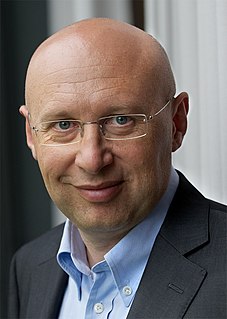A Quote by Kurt Vonnegut
And what is literature, Rabo," he said, "but an insider's newsletter about affairs relating to molecules, of no importance to anything in the universe but a few molecules who have the disease called 'thought'.
Related Quotes
Your body, which is bonding millions of molecules every second, depends on transformation. Breathing and digestion harness transformation. Food and air aren’t just shuffled about but, rather, undergo the exact chemical bonding needed to keep you alive. The sugar extracted from an orange travels to the brain and fuels a thought. The emergent property in this case is the newness of the thought; no molecules in the history of the universe ever combined to produce that exact thought.
The words are strung together, with their own special grammar-the laws of quantum theory-to form sentences, which are molecules. Soon we have books, entire libraries, made out of molecular "sentences." The universe is like a library in which the words are atoms. Just look at what has been written with these hundred words! Our own bodies are books in that library, specified by the organization of molecules-but the universe and literature are organizations of identical, interchangeable objects; they are information systems.
Captain John Sheridan: I wish I had your faith in the universe. I just don't see it. Delenn: Then I will tell you a great secret, Captain. Perhaps the greatest of them all. The molecules of your body are the same molecules that make up this station , and the nebula outside, that burn inside the stars themselves. We are starstuff. We are the universe made manifest, trying to figure itself out. And as we have both learned, sometimes the universe requires a change of perspective.
Suppose that you could mark the molecules in a glass of water; then pour the contents of the glass into the ocean and stir the latter throughly so as to distribute the marked molecules uniformly throughout the seven seas; if then you took a glass of water anywhere out of the ocean, you would find in it about a hundred of your marked molecules.
There are thousands of proteins in the cells, some of them very large chains of molecules. And the cell doesn't function if one of those chains of molecules isn't there, and you start looking at the complexity of life and the mystery of life, and then start thinking about things like the twenty universal constants, that if any one of them from Plank's minimum to the mass of a proton, if one of them is the tiniest bit off, there would be no life or possibility of it in the universe.
Why are atoms so small? ... Many examples have been devised to bring this fact home to an audience, none of them more impressive than the one used by Lord Kelvin: Suppose that you could mark the molecules in a glass of water, then pour the contents of the glass into the ocean and stir the latter thoroughly so as to distribute the marked molecules uniformly throughout the seven seas; if you then took a glass of water anywhere out of the ocean, you would find in it about a hundred of your marked molecules.
A great deal of the universe does not need any explanation. Elephants, for instance. Once molecules have learnt to compete and to create other molecules in their own image, elephants, and things resembling elephants, will in due course be found roaming around the countryside ... Some of the things resembling elephants will be men.
I have lived much of my life among molecules. They are good company. I tell my students to try to know molecules, so well that when they have some question involving molecules, they can ask themselves, What would I do if I were that molecule? I tell them, Try to feel like a molecule; and if you work hard, who knows? Some day you may get to feel like a big molecule!




































